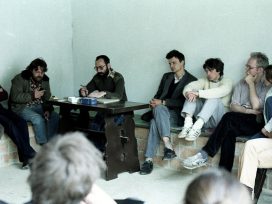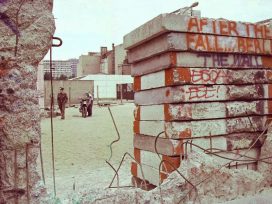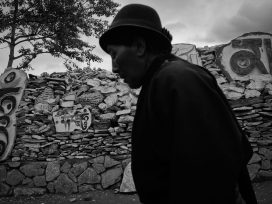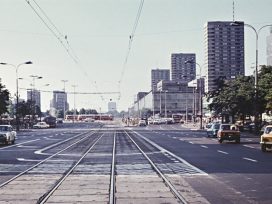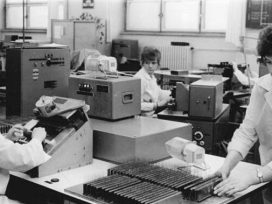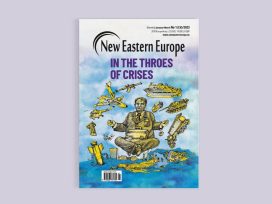Some of you may recall the western hopes in the aftermath of the Velvet Revolution that central Europe could enrich the western political world with fresh new ideas, values or insights that it lacked; that perhaps central Europeans might come up with a vision of a “third way” between capitalism and socialism. These hopes rested on the assumption that central Europeans’ experience of suffering under communism had made us better human beings, more inquisitive, sensitive and intellectual. Today, that hope looks pathetic, and it has become clear that western perceptions of central Europe were truly naive. Post-communist societies never had the confidence to convey any meaningful message to the western world; their mission was to adapt – as fast as possible – to the victors of the grand ideological conflict. They received clear-cut guidelines on how to go about building democracy and the market economy: the Copenhagen criteria and the Washington Consensus became the textbooks of our political elites.
There was so much to do that there was no time left for reflection – the only thing that was really abundant under the communist regime. I remember being concerned that the dense language of authors I used to savour in samizdat was being diluted by the haste of reading them in newspapers. But perhaps it was not even possible to reflect on the process we were then a part of, simply because our mindset was not yet ready. In hindsight, we can see that the 1989 revolution took place amidst dramatic global transformations whose main catalyst was not the demise of communism. Globalization was on the rise and the collapse of communism only contributed to the victorious euphoria of laissez-faire capitalism. The victory itself was perceived primarily in economic terms. Yet with the demise of communism, the West suddenly lost the “eastern” mirror that had compelled it to try to look and behave better, and this undermined the western post-war sense of responsibility for the moral state of the world. Perhaps we suspected all that, but had no time to deal with it. For us, the West had always been a constant – after all, it was so familiar from our dreams.
Thus, throughout the 1990s, we did our best to build capitalism, failing to see that capitalism was gradually being emptied of its sense of fairness and responsibility. We thought that what we were seeing was perfectly normal and had always been that way. That is why we put up with the daylight robbery that passed for privatization, believing it to be an integral part of western capitalism. Even today, when many in the West believe that “the invisible hand” has withered into a crippled stump, we refuse to acknowledge that our idea of capitalism was wrong and that we had simply experienced one particular version of it – one that is on its last legs.
All of this concerns us more than we are ready to admit. The current global crisis is no longer merely about how many billions should be pumped into the economy so that we can go back to accumulating wealth; it is increasingly about the societal processes that will have a far greater impact on the world than the fall of communism. To my mind, this is something very few people in the post-communist world are prepared to acknowledge. It seems to me that we still differ from the West in the delay and reluctance with which we reflect on our own blindness. This applies both to our perception of the past twenty years of building capitalism, as well as to our perception of communism.
Perhaps there is a certain logic to this reluctance: we simply do not want to relinquish our position at the top of the league table of the great events of the past half-century. During a recent panel discussion in Vienna, the British historian Timothy Garton Ash said that 1989 was the greatest moment in European history. “Can you suggest another date?” he asked, noticing several raised eyebrows in the audience. Garton Ash is right: however much you rummage through European history you won’t find a more fitting date.
However, that was twenty years ago, and we cannot halt the flow of history just because we wish to. In fact, we should be glad that history has granted us those twenty years as a kind of preparation for worse times. For instance, we have been lucky that Nato was enlarged ten years ago, at a time when Russia was too weak to stop it. We have been equally lucky that the EU enlargement took place at a time of economic euphoria. Had the crisis hit in 2000, we might still be knocking on the doors of Brussels, because the West would have been preoccupied with its own problems.
Central Europe has never experienced the degree of political freedom it enjoys today. If the world and Europe do not descend into chaos – and the threat today is more real than we are ready to admit – we will be able to say in a few decades that the achievement of central European nations has been truly stunning.
Yet this performance, though stunning, has so far been more or less conformist in nature. Of course, there have been lively and at times emotional debates about the appropriate course of action, but the terms of this debate have always been framed by the West and its values. Those debates were pragmatic, they tried to work out the fastest route to convergence with the West, the quickest and most effective way to reach our future and leave our past behind. In this respect, even the manner in which we dealt with legacy of communist rule was pragmatic: the so-called “lustrations” were seen – at least in the early stages – as a tool designed to speed up the transformations. Their aim was not to analyse our recent history, but merely to prevent former secret service agents and informants influencing our future.
And yet, if the West really expected some sort of intellectual enrichment to emanate from central Europe in the first month after the revolution, this would have to do precisely with our unique experience of totalitarianism. It would have to do with the appreciation of the value of freedom. And it soon became clear that central Europe collectively failed to convey and articulate this crucial insight. Instead, it could merely offer some of its great individuals, such as Vaclav Havel or Bronislaw Geremek.
Hence, we still owe it to the West and to ourselves to properly process, understand and articulate this unique experience. It is a paradox, because we are almost inundated with information about the past. We know almost everything about the evil essence of the regime; much has been written about its victims and their stories have been documented. And yet we are unable to agree on what the past was really like. We are unable to agree on whether to label the regime totalitarian or dictatorial; there is no consensus on how to treat the documents that the regime had left us – whether to approach them as genuine evidence, or to shun them as parts of a single grand lie that kept the whole system going. Reading Peter Esterhazy’s Revised Edition, which depicts a horrific series of denunciations that his beloved aristocratic father had been feeding the secret police for thirty years, one understands and approves of the cathartic function of the publication of such documents. On the other hand, it is also easy to understand Adam Michnik’s passionate arguments against putting ourselves at the mercy of the secret police records.
It seems to me that the past twenty years of debate all point to one thing: that we are still not free. All of us who lived at least part of our adult lives under communism have been marked by the past to the extent that we may never be able to discuss it in the language of a natural, free world. We may be able to distinguish between the courageous from the cowardly and victims from culprits, but not between those who are free and those who are not. The category of a free human being simply did not exist under the communist regime. Defiance, resistance or attempts to live a parallel life outside the system may have represented signs of longing for freedom but they did not represent freedom itself. This is why we can and we should bear witness and many deserve admiration and respect for their courage. Yet this does not entitle us to claim that we can interpret this part of history in a free and unbiased way. We are all like patients who self-diagnose and prescribe their own treatment.
The fight for history in the past twenty years was actually more of a fight for legitimacy on the part of those who are supposed to interpret history. Stalin’s former prisoners, the dissidents of the period after the Soviet invasion, the pragmatists from the so-called “grey zone”, communists, even state security members and their agents, have strived for this legitimacy. Certainly, a kind of social consensus exists whereby the right to interpret history belongs to the victims rather than the culprits. This right is perceived as a reward, and also as a sign of a certain respect for the turbulent lives particularly of the generation that I like to call “my father’s generation”. They were ardent communists in their youth, passionate reformers in the 1960s, and courageous dissidents in the 1970s and 1980s. Their lives form the backbone of Czech history of which they were participants, creators and harsh critics, all at the same time. Who else had such intimate knowledge of communism in all its manifestations? Who else should, then, have the right to interpret its reign? This generation produced a magnificent collective oeuvre – brilliant analyses and world-class novels – as part of an exercise in self-reflection that is probably unprecedented in Czech history. But here’s the catch: this generation’s oeuvre is so monumental that it becomes its own monument. And as we know, the function of monuments is to offer a stylized version, or in the worst case a mythologized version of history, rather than its unbiased interpretation.
In recent times, particularly in the context of debates about institutes that have been set up in many countries to explore the recent past, concern has been voiced in central Europe about the fact that the young historians who work in these institutions have had no personal experience of the former regime and therefore cannot understand the existential challenges and complex compromises the regime forced on nearly everyone who lived under it. It is a concern that future generations of historians will see the past from the standpoint of the present, through the eyes of those who have only known democracy. These people, it is thought, will write about the past in the language of freedom that has no mercy and no understanding of the nuances of the communist meta-language. In short, everyone who has ever had any dealings with the regime will be treated in the same way.
I do not share this concern. I believe that the only way the past can be properly interpreted is from the uncompromising vantage point of democratic ideals of freedom. And the only ones who have the wherewithal to do this and who can do it legitimately, because they are not linked to the past, are those who belong to the younger generation. Even if it means that young historians may initially be unfair, and that their work may be dictated by political agendas, as seems to be the case in Poland today. The desire to exercise control over the interpretation of history is understandable but pointless. From the biological point of view it also naive. In twenty years’ time, historians of today’s younger generation will not need our permission to interpret our history as they choose.
Of course, the reluctance to take the risk that history might appear in a different light than we wish is a phenomenon that is also known in the West. The French needed half a century to even start talking about the Vichy regime; the Swedes, too, have only recently remembered that, well into the 1970s, there was an official practice of sterilizing people not adapted to society. Yet I am convinced that in order to discuss whether central Europe has any specific values to offer the West, we must first find the courage to see what is evident. And what is evident is that we have not used the past twenty years to find that courage.
